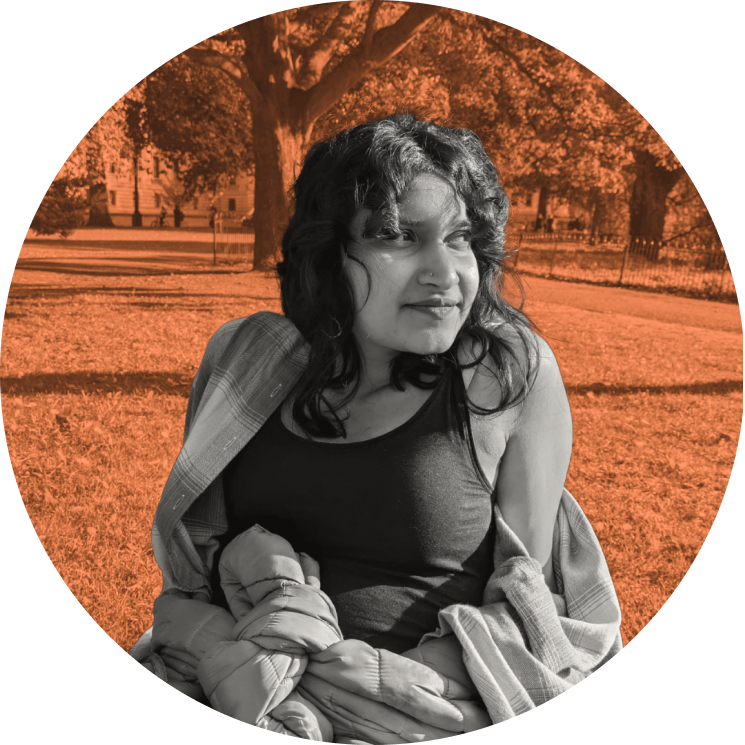
This workshop invites participants to reimagine storytelling through the lens of decolonisation using improvisational theatre (improv). Decolonisation in this context means rethinking and dismantling storytelling practices rooted in a Western-centric framework, which often marginalises non-Western perspectives. It’s about reclaiming the stories, names, characters, and humour that reflect our cultural identities and shared histories. This workshop emphasises collaborative storytelling and celebrates cultural specificity, encouraging participants to tell culturally rooted stories that resonate universally.
Through guided improv exercises, participants will learn to craft authentic narratives that honour their cultural heritage while appealing to broader audiences. They’ll explore how universal themes— can be expressed through unique cultural lenses, bridging personal and collective experiences.

Jugaad is a Hindi term that has seamlessly entered the English lexicon, defined by the Oxford Dictionary as a “flexible approach to problem-solving that uses limited resources in an innovative way.” This concept is deeply embedded in South Asian culture, where resourcefulness is not just a necessity but a creative force. Jugaad is also an act of resistance—anti-capitalist in nature—as it embraces using what we already own to create something new and meaningful, circumventing the need for consumerist solutions.
This hands-on workshop will explore printmaking techniques through the lens of jugaad. Instead of relying on expensive or specialized materials, we will utilize everyday household items to experiment with various printmaking styles to respond to a theme-based prompt. Participants will learn how to repurpose tools, innovate with accessible materials, and embrace the philosophy of making do with what we have—all while creating prints that reflect their artistic vision, which comes together into a community-focused response.

Mending as a word has made a tremendous comeback in recent years, especially due to the cost of living crisis, being described as a “trend” even. But what has happened that has made it “come back”? Simply put, consumerism. Ugo Vallauri, while speaking to Forbes about tackling the “throw away economy”, summed up this comeback beautifully, “At the most basic level, we want to fix our relationship with the products we buy”. This is what this workshop is about.
The transition between “oh let me get that zip in this bag replaced” to “oh let me get this bag replaced” has been seemingly quiet, ironic, in the face of the “SALE SALE SALE” messages we have been loudly fed. There is much to be said about FOMO marketing techniques and trends themselves, especially about them being drivers of consumerism and the people benefitting from it being the C word… capitalists, of course! To bring up the other heavy C word, consumerism and capitalism are tied to colonialism.

Let’s make paper as we talk about paper.
Why? Because it’s all around us. Not as paperless as we thought, are we?Paper, the vessel of knowledge, the container of records and an important yet overlooked tradeware through history. Paper has been central torecording and knowledge sharing, and has supported greater inventions like the printing press. Paper making as a craft is also traditional to southasian countries like Bhutan and Bangladesh. Overtime, paper integrated itself into our usage as more than just books- wallpapers, toilet paper,packaging, and more. Back home, street food vendors pack their samosas and vada pavs in paper bags. We also repurpose our newspapers aspackaging material or a cover for our wardrobe racks.
It fell slightly out of favour with the plastic boom, but ever since the discourse about plastic pollution, it has had the most glorious renaissance.Paper bags and paper straws became the poster children of our movement towards a “greener world”. Businesses began charging for plastic bags,then introduced paper bags, then started charging for paper bags, making the sunny claim of “donating the proceeds to charity” (yeah yeah). Soyou pay a little extra each time and walk out with your newest currency- a natural looking paper bag to flaunt your care for nature. And come on,we’ve all been on the other side of a completely disintegrated straw. When you can’t tell the pulp of the juice from that of the straw, you shrug andask for another one. Sustainability yay!

In this interactive tea making workshop, attendees are introduced to different tea cultures of South Asia. A truly ‘glocal’ commodity, teaoriginated in China, and is now an intrinsic part of British culture, finding prominence across the world. In South Asia, the Britishintroduced tea as an everyday beverage which is now adapted and consumed in several different ways using a multitude of localingredients. How did these tea drinking cultures in South Asia Emerge?
In this workshop, we talk about how tea culture grew in a localised manner in South Asian countries, carrying with it hints of its coloniallegacy inextricably blended with local flavours in the way it is consumed and celebrated today. We will prepare two different tea recipesfrom South Asia, and talk about our favourite teatime memories.

Somewhere along the way, ‘care’ for the things we own has been lost, or shrouded by the facade of convenience and immediate gratification. We no longer know where our things come from, who made them and where they end up, which leads to a major disconnect. There are many ways to address this issue, both on the part of consumers and producers. As consumers, we have to be mindful and responsible with how we consume and the extent to which we care.
Through this workshop, we will take a closer look at our relationship with clothes and textiles. By ‘documenting’ this relationship and cataloguing thetextile, we will create an alternative to a traditional museum by decolonising it, where the user/owner becomes the authority on it. In this ‘museum’,we will rediscover clothes and textiles as an extension of ourselves and a receptacle for memories in the journey of life, with which we form strongconnections over time. We will talk about emotions and tell stories, alongside tracing the history of the textile itself.